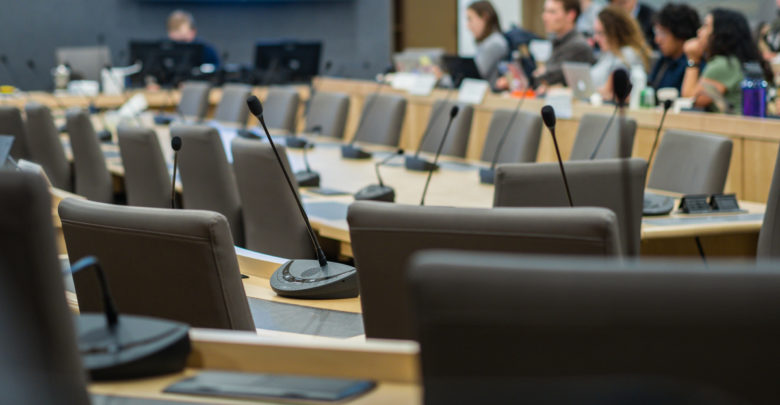Students’ Council did not violate legislation during BoG representative election, DIE Board rules
The DIE Board's decision, uploaded on February 9, declared no pieces of legislation were violated by the UASU during the BoG replenishment election.
 Helen Zhang
Helen ZhangAccording to the University of Alberta’s Discipline, Interpretation, and Enforcement (DIE) Board’s ruling, the Students’ Union did not violate any legislation during their replenishment election for interim Board of Governors (BoG) representative.
During the January 25 Students’ Council meeting, the interim Board of Governors (BoG) representative was selected via a replenishment election. Following this election Chanpreet Singh, engineering student, filed an application to the DIE Board — the ‘court’ of the Students’ Union — which is responsible for interpreting and enforcing the the Students’ Union’s bylaws. Singh’s application alleged a violation of Student[s’] Union Legislature by the Students’ Union (UASU) for conducting the vote for BoG representative during an in-camera session and not using preferential ballot.
In his DIE Board filing, Singh specifically claimed that the UASU broke the following pieces of UASU legislature:
- Bylaw 100 Section 6.5.: The appointment will be made with respect to a vote by Council using a preferential ballot.
- Structure of Sessions Section 2. j. Closed Session.: Closed session will only be held if items have been submitted to the speaker for discussion in closed session. The only items that may be submitted to the closed session are discussion or information items.
Singh’s application did note it is “unknown [if] Bylaw 100, Section 6.5 was also violated or not,” but claimed it was “highly likely that a normal ballot was used rather than a preferential ballot.” His application offered no further evidence to support this claim.
Singh’s application requested Phillip Miheso, the speaker of council, “provide clarification on if the preferential ballot was used” and “what was the voter turnout along with votes cast for each candidate.”
Singh and Miheso present cases to DIE Board, ruling declares no legislation was violated
At the hearing, which was held on January 30, the DIE Board heard the oral submissions of Singh and Miheso. In addition to these oral submissions, both parties presented witnesses to give statements relating to the application.
Singh’s opening statement expressed concerns over in-camera voting along with the possibility of a preferential ballot not being used.
“In this DIE hearing, I will be challenging… [whether] the preferential ballot was used or not… [and] if the voting took place in-camera not, and if it is the violation of [Structure of Sessions Section 2. j. Closed Session]. Thirdly at the end [of the January 25 meeting] council discussed the item in the in-camera session, which was not a discussion or information item … which violated the bylaws by being discussed in an in-camera session.”
This was followed by an opening statement from Miheso, who provided context around the BoG replenishment election.
“There are some pieces that are really important to be able to bring contextually to this matter,” he said. “We had recently lost our BoG representative so that meant we needed a replenishment [election] as soon as possible.”
“Since a replenishment of this nature has not occurred in many years, we decided to take a precedent that has already existed from the Speaker’s election process. All processes followed for the Speaker [election process] were put into practice for this.”
Both Singh and Miheso had witnesses present. Haruun Ali, U of A student and former candidate for the interim BoG representative position, was there as a witness for Singh. Rowan Ley, UASU president, and Lucas Marques, UASU Chief Returning Officer (CRO), were there as witnesses for Miheso. After opening statements, witnesses got a chance to orally present their cases, and were cross-examined.
After the hearing concluded, both sides were told that the official ruling would be uploaded in approximately three business days. The decision, which was uploaded on February 9, declared no pieces of legislation were violated during the BoG replenishment election.
The DIE Board described Singh’s allegation that preferential ballot was not used as “based solely on speculation.” This allegation was therefore dismissed by the DIE Board.
“Singh’s allegation is based on an inference from the observed fact that the time taken to tabulate the vote was shorter than he expected and clearly falls under the definition of opinion… basing the inference that a Bylaw was violated on opinion is unreasonable and cannot ground the remedy sought by Singh,” the DIE Board said.
“Given the fact that Mr. Singh offered no evidence to substantiate his allegation… the Board cannot in good conscious accept this claim and dismisses it outright.”
When considering Singh’s claim that Structure of Sessions Section 2. j. Closed Session was violated, the DIE Board described it as an allegation based “on matters of legislative interpretation.”
When considering matters of legislative interpretation, the DIE Board described following “the widely accepted approach employed by the Supreme Court of Canada” which requires interpretation of legislation not focus solely on the wording of the documents, but instead be considered in their entire context.
“Put another way, if legislative language permits two possible interpretations of a provision, one of which is inconsistent with the larger legislative scheme and one that is not, then the consistent interpretation will be used,” the DIE Board’s decision said.
“When properly applying the modern, principled approach of statutory interpretation to the impugned legislation, in this case, the Board is satisfied that the Council did not violate [Structure of Sessions Section 2. j. Closed Session].”




